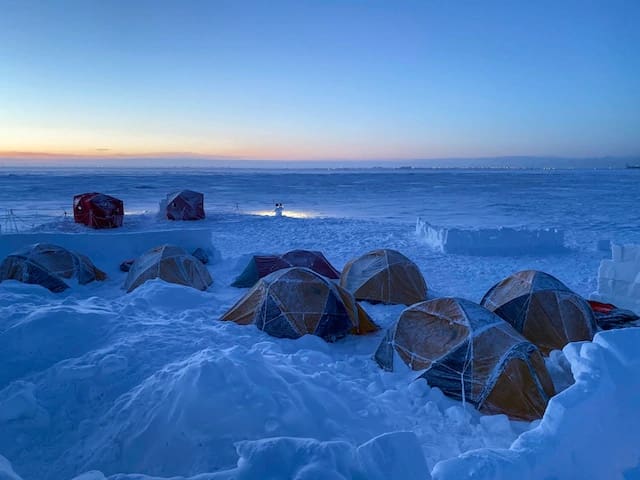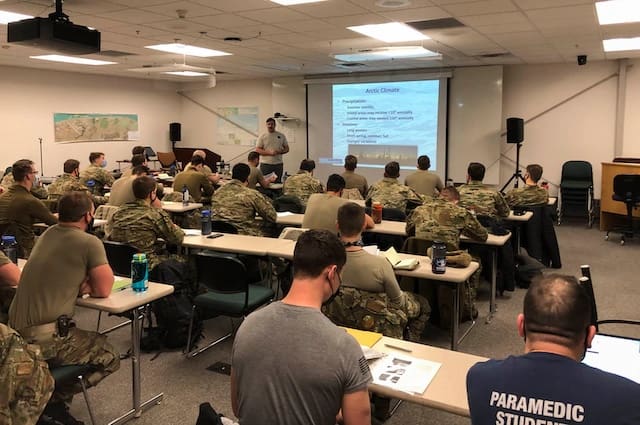EIELSON AIR FORCE BASE, Alaska (AFNS) —
Wind gusts as high as 50 mph, wind chills dropping to minus 60 degrees Fahrenheit, and a place where the sun does not rise above the horizon for 65 consecutive days. Arctic survival training is not for the faint of heart however for the survival, evasion, resistance and escape specialists, it is a rite of passage.

SERE specialists from across the country participated in S-V81-C Barren Land Arctic Survival training Jan. 9-23 in Utqia?vik (Barrow), Alaska.
S-V81-C is a part of the SERE five-level upgrade course where SERE specialists gain valuable experience surviving in the harsh arctic environment.
“It’s the experiential factor that enables Air Force SERE specialists to provide the highest standard of arctic training to the Department of Defense,” said Master Sgt. Garrett Wright, Detachment 1, 66th Training Squadron, Arctic Survival School superintendent.

After leaving Barrow and completing training, SERE specialists have gained a new understanding of the difficult conditions isolated personnel could face in the Arctic. With this knowledge in hand, SERE specialists are able to educate personnel across the globe on the various environments they operate in.
From Eielson Air Force Base, five SERE specialists from the 66th Training Squadron, Detachment 1 led S-V81-C training in Barrow.
Staff Sgt. Jeffrey Waterbury, 66th TRS, Det. 1 operations noncommissioned officer in charge, once a student, is now responsible for imparting his technical expertise to others at S-V81-C.
“It is cool to teach a course that I came through (years ago),” said Waterbury. “I never really thought that I would be doing it again; especially running operations for it.”
This year, two classes trained in Barrow and 44 students graduated the course. 24 participants from Jan. 9-16 and 20 from Jan. 16-23. Active duty, Guard and Reserve SERE specialists attended this year’s training along with personnel from the 123rd Contingency Response Group and the Air Force Joint Test Program Office.

This year, Cool School’s operations were supported by an independent medical duty technician from the 354th Medical Group and two defenders from the 354th Security Forces Squadron, who provided overnight polar bear guard.
Additionally, a team led by Lt. Col. Nathan Barrett, the AFJO joint test director, conducted shelter temperature testing as part of Cool School’s efforts to modernize its instructional data.
S-V81-C training includes a day of academic instruction where students learn about health, sustenance, personal protection, signaling, recovery and travel in an arctic environment.
Throughout the week, students learn how to operate in the Arctic and build shelters from snow caves to igloos. In total, students construct six different shelter configurations over the course of four days, to enable their survival in the Arctic tundra.
The Cool School team brought the students out to the Chukchi Sea where they ignited MK-124s, a smoke and illumination flare, to learn about the intricacies of signaling and recovery.
One of the highlights of the training is the cultural immersion with the local indigenous people, giving many students a broader perspective and appreciation for the Arctic.
“Our students have a unique opportunity to learn from the indigenous people, so they can come to a better understanding of the cultural influences that enabled them to survive in such a harsh region for thousands of years,” said Maj. Tyler Williams, 66th TRS, Det. 1 commander. “Before all of this modern equipment, it was the cultural values and practices that allowed them to thrive in this region.”
This immersion also aligns with the Department of the Air Force Arctic Strategy through collaborative planning opportunities particularly building upon relationships with indigenous communities in the Arctic region to learn from their expertise.
What makes this year’s training different from its previous iterations is the introduction of the geopolitical aspects of recovery.
“There’s a lot of people who live across the Arctic,” Wright said. “Students have to understand that they might not be picked up by American forces and they may not even be military.”
Williams emphasized that this training plays an important role in mission preparation to the Air Force Arctic Strategy. The Air Force has recognized the importance to prepare aircrew for operations in extreme polar regions, and SERE specialists perform a vital role in doing just that.
“It doesn’t matter if you’ve got the best equipment or aircraft in the world,” Williams said. “If you don’t have the right training, the Arctic environment will kill you.”
Story by Airman 1st Class Jose Miguel T. Tamondong, 354th Fighter Wing Public Affairs
Photos by Maj Tyler Williams and MSgt Ryan M. Dewey


Looks like a fun camping trip! Watch out for those polar bears….they might give you covid! Lol 🙂